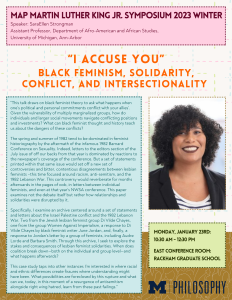Presented By: Department of Philosophy
MAP Martin Luther King Jr. Symposium
SaraEllen Strongman (Assistant Professor, Department of Afro-American and African Studies, University of Michigan, Ann-Arbor)

Title: “I accuse you”: Black feminism, solidarity, conflict, and intersectionality
Abstract: This talk draws on black feminist theory to ask what happens when one’s political and personal commitments conflict with your allies’. Given the vulnerability of multiply marginalized groups, how do individuals and larger social movements navigate conflicting positions and investments? What can black feminist thought and history teach us about the dangers of these conflicts?
The spring and summer of 1982 tend to be dominated in feminist historiography by the aftermath of the infamous 1982 Barnard Conference on Sexuality. Indeed, letters to the editors section of the July issue of off our backs from that year is dominated by reactions to the newspaper’s coverage of the conference. But a set of statements printed within that same issue would set off a new set of controversies and bitter, contentious disagreements between lesbian feminists –this time focused around racism, anti-semitism, and the 1982 Lebanon War. This controversy would reverberate for months afterwards in the pages of oob, in letters between individual feminists, and even at that year’s NWSA conference. This paper examines not the debate itself but rather how relationships and solidarities were disrupted by it.
Specifically, I examine an archive centered around a set of statements and letters about the Israel Palestine conflict and the 1982 Lebanon War. Two from the Jewish lesbian feminist group Di Vilde Chayes, one from the group Women Against Imperialism, a response to Di Vilde Chayes by black feminist writer June Jordan, and, finally, a response to Jordan’s letter by a group of feminists, including Audre Lorde and Barbara Smith. Through this archive, I seek to explore the stakes and consequences of lesbian feminist solidarities. When does coalition break down—both on the individual and group level—and what happens afterwards?
This case study taps into other instances I’m interested in where racial and ethnic differences create fissures where understanding might have been. What possibilities are foreclosed by this rupture and what can we, today, in this moment of a resurgence of antisemitism alongside right wing hatred, learn from these past failings.
Abstract: This talk draws on black feminist theory to ask what happens when one’s political and personal commitments conflict with your allies’. Given the vulnerability of multiply marginalized groups, how do individuals and larger social movements navigate conflicting positions and investments? What can black feminist thought and history teach us about the dangers of these conflicts?
The spring and summer of 1982 tend to be dominated in feminist historiography by the aftermath of the infamous 1982 Barnard Conference on Sexuality. Indeed, letters to the editors section of the July issue of off our backs from that year is dominated by reactions to the newspaper’s coverage of the conference. But a set of statements printed within that same issue would set off a new set of controversies and bitter, contentious disagreements between lesbian feminists –this time focused around racism, anti-semitism, and the 1982 Lebanon War. This controversy would reverberate for months afterwards in the pages of oob, in letters between individual feminists, and even at that year’s NWSA conference. This paper examines not the debate itself but rather how relationships and solidarities were disrupted by it.
Specifically, I examine an archive centered around a set of statements and letters about the Israel Palestine conflict and the 1982 Lebanon War. Two from the Jewish lesbian feminist group Di Vilde Chayes, one from the group Women Against Imperialism, a response to Di Vilde Chayes by black feminist writer June Jordan, and, finally, a response to Jordan’s letter by a group of feminists, including Audre Lorde and Barbara Smith. Through this archive, I seek to explore the stakes and consequences of lesbian feminist solidarities. When does coalition break down—both on the individual and group level—and what happens afterwards?
This case study taps into other instances I’m interested in where racial and ethnic differences create fissures where understanding might have been. What possibilities are foreclosed by this rupture and what can we, today, in this moment of a resurgence of antisemitism alongside right wing hatred, learn from these past failings.